动词时态之过去时
过去时态变化的规则概述
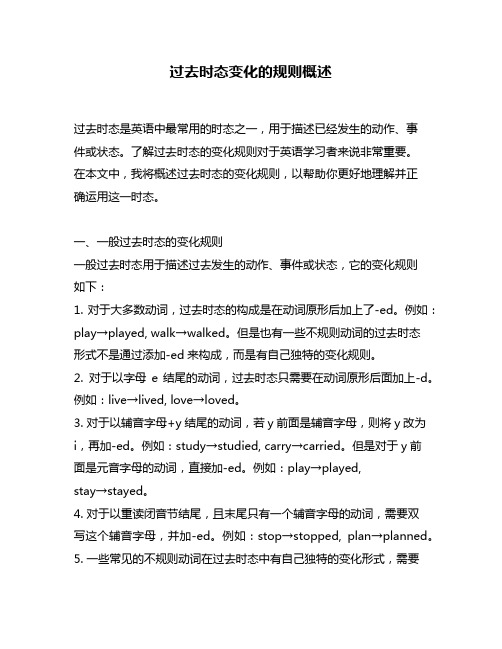
过去时态变化的规则概述过去时态是英语中最常用的时态之一,用于描述已经发生的动作、事件或状态。
了解过去时态的变化规则对于英语学习者来说非常重要。
在本文中,我将概述过去时态的变化规则,以帮助你更好地理解并正确运用这一时态。
一、一般过去时态的变化规则一般过去时态用于描述过去发生的动作、事件或状态,它的变化规则如下:1. 对于大多数动词,过去时态的构成是在动词原形后加上了-ed。
例如:play→played, walk→walked。
但是也有一些不规则动词的过去时态形式不是通过添加-ed来构成,而是有自己独特的变化规则。
2. 对于以字母e结尾的动词,过去时态只需要在动词原形后面加上-d。
例如:live→lived, love→loved。
3. 对于以辅音字母+y结尾的动词,若y前面是辅音字母,则将y改为i,再加-ed。
例如:study→studied, carry→carried。
但是对于y前面是元音字母的动词,直接加-ed。
例如:play→played,stay→stayed。
4. 对于以重读闭音节结尾,且末尾只有一个辅音字母的动词,需要双写这个辅音字母,并加-ed。
例如:stop→stopped, plan→planned。
5. 一些常见的不规则动词在过去时态中有自己独特的变化形式,需要进行记忆和掌握。
例如:go→went, have→had, do→did。
二、过去进行时态的变化规则过去进行时态用于描述过去某一时刻正在进行的动作或事件。
它的变化规则如下:1. 对于大多数动词,过去进行时态的构成是“was/were + 动词-ing”。
例如:I was studying, They were playing。
2. 对于以不发音的-e结尾的动词,只需要在词尾加上-ing。
例如:love→loving, dance→dancing。
3. 对于以重读闭音节结尾,末尾只有一个辅音字母的动词,需要双写这个辅音字母,并加-ing。
动词时态全面解析过去现在将来

动词时态全面解析过去现在将来动词时态全面解析:过去、现在、将来动词时态是语法中一个非常重要的概念,它描述了动作发生的时间。
根据不同的时间点,动词时态可以分为过去时、现在时和将来时。
本文将对这三种时态进行全面解析,并讨论它们在不同语境下的用法和形式。
一、过去时态过去时态用于表达在过去某个特定时间内或过去的某个时间段内发生的动作或状态。
在英语中,过去时态主要有三种形式:一般过去时、过去进行时和过去完成时。
1. 一般过去时一般过去时是过去时态中最常用的形式,表示过去某个时间内发生的动作或状态。
它通常使用动词的过去式形式。
例句1:Yesterday, I went to the park and played basketball with my friends.(昨天,我去了公园并和朋友们打了篮球。
)例句2:He studied English for two hours last night.(昨晚他学了两个小时的英语。
)2. 过去进行时过去进行时描述过去某个时间点或某个时间段内正在进行的动作。
它由“was/w ere + 动词的ing形式”构成。
例句1:She was cooking dinner when I called her.(当我给她打电话时,她正在做晚饭。
)例句2:We were watching a movie at that time.(那个时候我们正在看电影。
)3. 过去完成时过去完成时用来表示过去某个时间或事件之前已经完成的动作。
它由“had + 过去分词”构成。
例句1:By the time I arrived, they had already left.(当我到达时,他们已经离开了。
)例句2:She had finished her homework before dinner.(晚饭之前,她已经完成了她的家庭作业。
)二、现在时态现在时态用于表示目前正在发生的动作或状态,也包括一些客观事实和普遍真理。
(完整)小学英语语法时态一般过去时详解
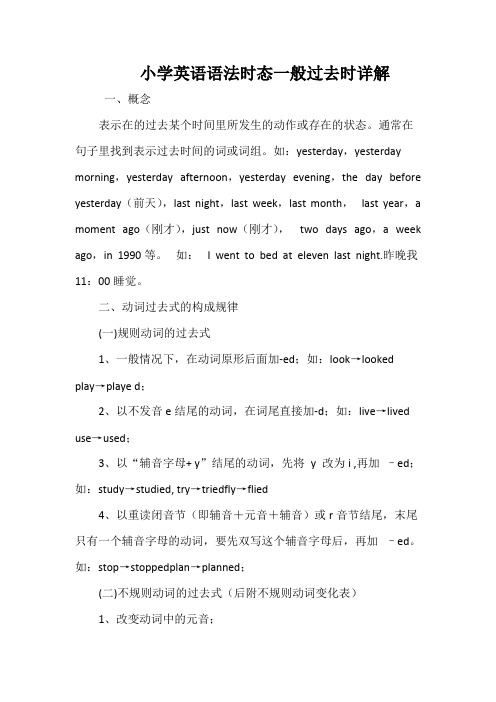
小学英语语法时态一般过去时详解一、概念表示在的过去某个时间里所发生的动作或存在的状态。
通常在句子里找到表示过去时间的词或词组。
如:yesterday,yesterday morning,yesterday afternoon,yesterday evening,the day before yesterday(前天),last night,last week,last month,last year,a moment ago(刚才),just now(刚才),two days ago,a week ago,in 1990等。
如:I went to bed at eleven last night.昨晚我11:00睡觉。
二、动词过去式的构成规律(一)规则动词的过去式1、一般情况下,在动词原形后面加-ed;如:look→looked play→playe d;2、以不发音e结尾的动词,在词尾直接加-d;如:live→lived use→used;3、以“辅音字母+ y”结尾的动词,先将y 改为i ,再加–ed;如:study→studied, try→triedfly→flied4、以重读闭音节(即辅音+元音+辅音)或r音节结尾,末尾只有一个辅音字母的动词,要先双写这个辅音字母后,再加–ed。
如:stop→stoppedplan→planned;(二)不规则动词的过去式(后附不规则动词变化表)1、改变动词中的元音;begin→began drink→drank come→came eat→ate grow→grew run→ran know→knew win→wonspeak→spoketake→took write→wrote get→got2、变词尾的–d 为–t ;build→built lend→lent send→sent spend→spent bend→bent3、与动词原形一样;cut→cut put→put cost→cost hurt→hurt shut→shut4、变-ay 为-aid (少数动词);say→said pay→paid lay→laid5、采用不同词根;sell→sold teach→taught buy→bought6、其他。
过去时的四种时态
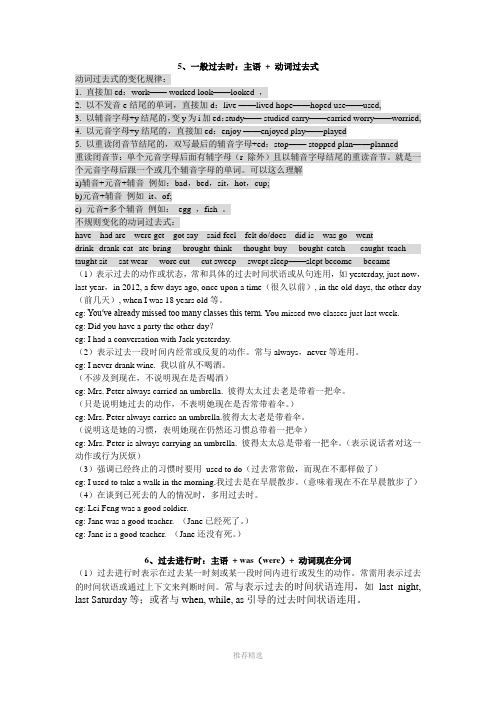
5、一般过去时:主语+ 动词过去式动词过去式的变化规律:1. 直接加ed:work—— worked look——looked ,2. 以不发音e结尾的单词,直接加d:live ——lived hope——hoped use——used,3. 以辅音字母+y结尾的,变y为i加ed:study—— studied carry——carried worry——worried,4. 以元音字母+y结尾的,直接加ed:enjoy ——enjoyed play——played5. 以重读闭音节结尾的,双写最后的辅音字母+ed:stop—— stopped plan——planned重读闭音节:单个元音字母后面有辅字母(r 除外)且以辅音字母结尾的重读音节。
就是一个元音字母后跟一个或几个辅音字母的单词。
可以这么理解a)辅音+元音+辅音例如:bad,bed,sit,hot,cup;b)元音+辅音例如it、of;c) 元音+多个辅音例如:egg ,fish 。
不规则变化的动词过去式:have---had are---were get---got say---said feel---felt do/does---did is---was go---wentdrink--drank eat--ate bring----brought think----thought buy----bought catch---- caught teach ---- taught sit----sat wear----wore cut----cut sweep----swept sleep——slept become----became(1)表示过去的动作或状态,常和具体的过去时间状语或从句连用,如yesterday, just now,last year,in 2012, a few days ago, once upon a time(很久以前), in the old days, the other day (前几天), when I was 18 years old等。
英语时态之一般过去时的用法讲解

英语时态之一般过去时的用法讲解一、概念一般过去时用来表示过去某一时间内发生的动作或存在的状态以及过去习惯性、反复性的动作..谓语动词要用动词的过去式;常和表示过去的时间状语连用;如yesterday昨天、last night昨晚、last week上周、last year去年、…ago等二、结构1. Be动词的一般过去时在没有实义动词的句子中使用be动词am is 的过去式为was; are的过去式为were;was是表示单数;were是表示复数肯定句式:主语 + bewas ; were + 其它.否定句式:主语 + bewas ; were + not + 其它.一般疑问句:Bewas ; were + 主语 + 其它2. 实义动词的一般过去时态肯定句要使用动词的过去式;否定句和疑问句要使用助动词did.肯定句式:主语 + 动词过去式+ 其它否定句式:主语 + didn’t + 动词原形+ 其它 did not = didn’t 一般疑问句:Did + 主语+ 动词原形+ 其它do ; does的过去时均为did 注:did和didn’t 是构成一般过去时的助动词;其特点是要在其后跟动词的原形三、规则动词的过去式1.一般情况下;在动词原形后面加-ed:looked played startedvisited stayed2.以不发音e结尾的动词;在词尾直接加-d: lived cloesd likedloved tasted3.以“辅音字母+ y”结尾的动词;先将 y 改为i ;再加–ed:study→studied try→tried cry→cried copy→copiedcarry→carried4.以重读闭音节即辅音+元音+辅音或r音节结尾;末尾只有一个辅音字母的动词;要先双写这个辅音字母后;再加–ed: stop→stoppedplan→planned四、不规则动词的过去式需特殊记忆1. is→was am→was are→were do→did have→had2. begin→began ring→rang run→ran drink→dranksing→sang swim→swamsit→sat give→gave make→made come→cameeat→ate3.write →wrote speak→spoke drive→drove choose→chosetell→told ride→rodeshoot→shot get→got win→won forget→forgotshake→shook take→took stand→stood4. go→went meet→met sleep→slept sweep→sweptspell→speltfeel→felt keep→kept spend→spent bend→bent5. know→knew fly→flew blow→blew grow→grew throw→threwdraw→drew 特别注意:glow→glowed6. teach→taught catch→caught buy→bought fight→fought think→thought7. find→found hear→heard say→said lie→lay see→saw learn→learnt mean→meant8. put→put read→read cut→cut let→let一般过去时练习题一、单项选择:从下列各题后所给的四个选项中选择最佳答案填空..101. My father______ill yesterday.A. isn't B. aren't C. wasn't D. weren't2.______your parents at home last week﹖A. Is B. Was C. Are D. Were3. The twins______in Dalian last year. They______here now.A.are; were B.were; are C.was; are D. were; was4.______your father at work the day_____yesterday前天﹖A. Was; before B. Is; before C. Was; afterD. Is; after5.—Who was on duty last Friday﹖—______.A. I am B. I was C. Yes; I was D. No;I wasn't二、请用正确动词形式填空..101. I _________ have an exciting party last weekend.2. _________ she _________practice her guitar yesterdayNo; she _________.3. What ________ Tom ________ do on Saturday eveningHe ________watch TV and __________read an interesting book.4. They all _________go to the mountains yesterday morning.5. She _________not visit her aunt last weekend.She ________ stay at home and _________do some cleaning.三、翻译下列句子201. 我过了一个忙碌但却刺激的周末..I _________ _________ __________ __________ exciting weekend.2. Jenny喜欢看书..昨晚她看了一本英语书..Jenny likes _________ __________.She _________ an English book last night.3. Emma每天都看电视..可是昨天他没有看..Emma__________ TV every day.But he _________ ________ ________ yesterday.4. 上周六他们做什么了他们做作业和购物了..What ________ they _________ _________ SaturdayThey _________ __________ homework and _________ __________.5. 今天早上方方得做饭;因为他父亲不在家..This morning Fangfang ____ ____ ____ ____ because his father _____ _____ ____ yesterday.四、改写句子:201、Lucy did her homework at home.改否定句Lucy ________ _______ her homework at home.2、He found some meat in the fridge冰箱.变一般疑问句___________ he __________ ___________ meat in the fridge3、There was some orange in the cup.变一般疑问句_______ there _______ orange in the cup4. Frank read an interesting book about history. 一般疑问句_______ Frank _______ an interesting book about history5. Why not go out for a walk 同义句_______ ________ ________ out for a walk五、改错题201.How is Jane yesterday _____________________2.He go to school by bus last week. ____________________________ 3.He often goes home at 6:00 last month.____________________________4.I can fly kites seven years ago.______________________________5.Did you saw him just now.____________________________________六、完形填空10Tom did not like doing his homework;because he liked to do some 1 things after school.And his teacher always 2 a lot of mistakes in his homework.Then one day;his maths teacher 3 at Tom’s homework and saw that he got all his answers right.He was very 4 and surprised 惊奇.The next morning before class;he called Tom 5 his desk and6 to him;“You got all your homework right this time.Did yourfather help you”Sometimes Tom’s father helped him with his homework; 7 this time he didn’t help Tom because he 8 at home.So Tom answered;“NO;Sir.He Was busy last night;so I 9 to do it10 .”1.A.others B.another C.the other D.other2.A.made B.found C.looked at D.looked3.A.laughed B.knocked C.looked D.saw4.A.please B.pleased C.pleasure D.sad5.A.to B.for C.in D.at6.A.talked B.asked C.spoke D.said7.A.and B.but C.so D.or8.A.isn’t B.won’t be C.wasn’t D.can’t be9.A.wanted B.mustn’t C.liked D.had10.A.itself B.of them C.myself D.himself七、用所给词的适当形式填空..1. Tom and Mary ___________ come to China last month.2. Mike _________________not go to bed until 12 o’clock last night. So he ______ get up late.3. Mary __________ read English yesterday morning.4. There _________ be no one here a moment ago.5. I ___________ call Mike this morning.6. I listened but ___________ hear nothing.7. Tom ___________ begin to learn Chinese last year.8. Last week we _________ pick many apples on the farm.9. My mother ________________ not do housework yesterday.10. She watches TV every evening. But she ____________ not watch TV last night.11.________ your father ________ go to work every day last year 12.--What time _______ you _______ get to Beijing yesterday--We __________ get to Beijing at 9:00 in the evening.13. What __________ make him cry 哭 just now14. Last year the teacher ___________ tell us that the earth moves around the sun.15. There ____________ a telephone call for you just now. be16. There __________ not enough people to pick apples that day. be17. There _____________ be not any hospitals in my hometown 家乡in 1940.18. There ____________ enough milk at home last week; wasn’t there19. Eli ____________ to Japan last week. move20. –When _______ you _________ come to china Last year.21. Did she ________ have supper at home22. Jack ____________ not clean the room just now.23. _________ be it cold in your city yesterday24. How many people ________ be there in your class last term25. It ________ be hot yesterday and most children _______ be outside.26. There ________ be a football match on TV yesterday evening; butI _________ have no time to watch it.八、请用正确动词形式填空..1. I _________ have an exciting party last weekend.2. _________ she _________practice her guitar yesterday No; she _________.3. What ________ Tom ________ do on Saturday eveningHe ________watch TV and __________read an interesting book.4. They all _________go to the mountains yesterday morning.5. She _________not visit her aunt last weekend. She ________ stay at home and _________do some cleaning.。
动词时态概述过去现在和将来时
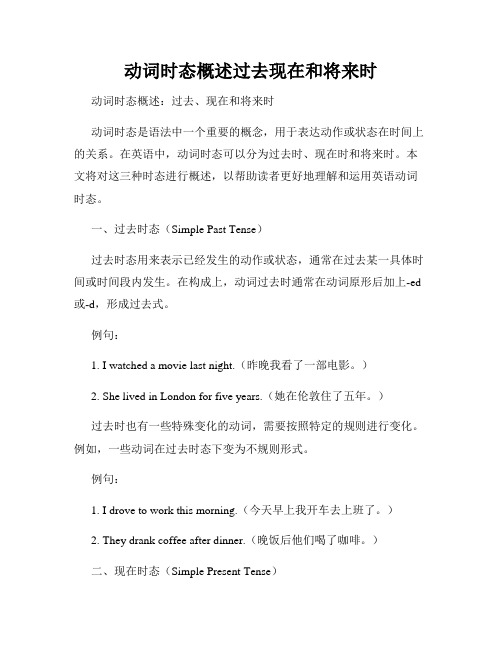
动词时态概述过去现在和将来时动词时态概述:过去、现在和将来时动词时态是语法中一个重要的概念,用于表达动作或状态在时间上的关系。
在英语中,动词时态可以分为过去时、现在时和将来时。
本文将对这三种时态进行概述,以帮助读者更好地理解和运用英语动词时态。
一、过去时态(Simple Past Tense)过去时态用来表示已经发生的动作或状态,通常在过去某一具体时间或时间段内发生。
在构成上,动词过去时通常在动词原形后加上-ed 或-d,形成过去式。
例句:1. I watched a movie last night.(昨晚我看了一部电影。
)2. She lived in London for five years.(她在伦敦住了五年。
)过去时也有一些特殊变化的动词,需要按照特定的规则进行变化。
例如,一些动词在过去时态下变为不规则形式。
例句:1. I drove to work this morning.(今天早上我开车去上班了。
)2. They drank coffee after dinner.(晚饭后他们喝了咖啡。
)二、现在时态(Simple Present Tense)现在时态用来表示经常性的动作、普遍真理、现在的状态以及计划中的未来事件。
在构成上,一般在动词原形后加-s或-es。
例句:1. He reads newspapers every morning.(他每天早上读报纸。
)2. The sun rises in the east.(太阳从东方升起。
)在现在时态中,也存在一些特殊的动词形式。
例如,与第三人称单数主语相关的动词需要在动词后加上-es。
例句:1. She teaches English at a school.(她在一所学校教英语。
)2. He misses the bus every day.(他每天都晚上公交车。
)三、将来时态(Simple Future Tense)将来时态用来表示将来发生的动作或状态。
动词时态掌握过去现在和将来的正确用法

动词时态掌握过去现在和将来的正确用法动词时态是语法中一个非常重要的概念,它用来表示动作或状态发生的时间。
正确使用动词时态可以帮助我们准确表达过去、现在和将来的动作,增强语言的准确性和流畅性。
本文将围绕过去、现在和将来的动作分别介绍其正确的时态使用。
过去时态过去时态表示在过去某个时间点或某个时间段发生的动作或状态。
过去时态常用的几种形式包括简单过去时、过去进行时、过去完成时以及过去完成进行时。
1. 简单过去时:动词的过去式形式表示一种已经结束的或持续了一段时间的动作或状态。
例句:I walked to the park yesterday.(昨天我走到了公园。
)例句:She studied hard for the exam last night.(昨晚她为了考试努力学习。
)2. 过去进行时:be动词的过去式加上动词的ing形式表示过去某一时刻或某一段时间里正在进行的动作。
例句:They were playing soccer when it started to rain.(当下雨时他们正在踢足球。
)例句:I was watching TV when she called me.(她给我打电话时我正在看电视。
)3. 过去完成时:had + 过去分词形式表示在过去某个时间点之前已经完成的动作或状态。
例句:They had already left when I arrived.(我到达时他们已经走了。
)例句:She had finished her homework before dinner.(吃晚饭之前她已经完成了作业。
)4. 过去完成进行时:had been + 动词的ing形式表示过去某一时刻之前一直在进行的动作。
例句:He had been studying for hours before he finally took a break.(他在休息之前已经学习了几个小时。
)例句:She had been waiting at the bus stop for 20 minutes before the bus finally arrived.(公交车终于到站时,她在车站等了20分钟。
动词过去时态整理

is,am—was
are—were
do—diddon’t—didn’t
can—couldcan’t—couldn’t
go—went
have,has—had
take—tookeat—atemake—made
drink—drankswim—swamsee—saw
run—ransit—satgive—gave
ride—rodewake—wokeget—got
sleep—sleptfeel—felt fall—fell off
buy—boughtthink—thought
过去式与动词原形一样:read—readhurt—hurt
3、以“辅音字母+y”结尾的动词,把y改成i,加-ed,如
study—studiedtry—tried(尝试)cry—cried(哭)
copy—copied(复制,抄写)carry—carried(携带,搬运)worry—worried (担心)
4、重读闭音节动词,双写词尾辅音字母,再加-ed,
如:stop—stoppedplan—planned trip—tripped (绊倒)
watch—watched[t]jump—jumped[t](跳)
work—worked[t]lick—licked[t](舔)
cook—cooked[t]laugh—laughed[t](笑)
talk—talked[t](谈论)look—looked[t]
ask—ask
want—wanted[id]
visit—visited[id]
need—needed[id](需要)
2、以不发音的-e结尾动词,动词词尾加-d,
动词过去时态复习
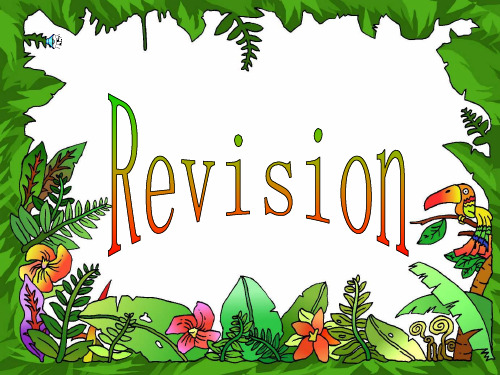
结构: 主语+动词过去式 常见时间状语: yesterday, yesterday morning (afternoon, evening…) last night (week, month, year…) two days ago, a week ago, three years ago… in 1990, (in 1998…) this morning, on my fifth birthday,
三、变换句式。
一)变一般疑问句。
1.We visited our friends last night.
Did you visit your friends last night?
2.My mother made a birthday cake for me last Sunday.
d your mother make a birthday cake for you last Sunday?
washed (wash) my coat myself two 12. I __________ hours ago.
13. When I ______(wake) up in the morning, I woke _______(find) a package next to my bed. found 14.They ______(swim) in a river when they swam _____(are) children. were 15.Linda’s parents _______(send) her a new sent scooter. 16.Bill ______(give) a speech yesterday. gave
动词过去时练习及变化规则

动词过去时练习及变化规则
动词过去时是表示过去发生或已完成的动作或状态的一种时态。
在英语中,动词的过去时形式通常通过在动词词干后加上-ed或-d
来构成。
然而,过去时的变化规则是多样的。
下面是一些常见的动词过去时的变化规则:
1. 一般规则:大多数动词在词干后加上-ed构成过去时。
- 例如:play → played, walk → walked
2. 以字母“e”结尾的动词:以字母“e”结尾的动词在词干后加上-
d构成过去时。
- 例如:like → liked, dance → danced
3. 以辅音字母+y结尾的动词:当以辅音字母+y结尾的动词,
变化过去时时,将字母“y”改为“i”,再加上-ed。
- 例如:study → studied, try → tried
4. 以重读闭音节结尾的单词:当一个单词以重读闭音节结尾,并且末尾只有一个辅音字母,需要重复结尾的辅音字母,并加上-ed。
- 例如:stop → stopped, plan → planned
5. 不规则动词:有一些动词的过去时形式并不遵循上述规则,而是具有特殊的变化形式。
- 例如:go → went, be → w as/were
如需深入了解动词过去时的变化规则和练,请参考相关英语语法教材或在线研究资源。
在练过程中,通过大量的阅读和练,你将更加熟练地运用和理解动词过去时。
希望以上信息对你有所帮助!。
动词时态之过去时(教师用)

动词的时态之过去时(教师用)一、一般过去时1.两个“基本”用法:体会:1. San Francisco Was (1906年4月的旧金山大地震时某新闻报道的导语;可译为:旧金山已成为过去)2.–Do you have to play that music so loud? I’ve got a test tomorrow!--Sorry, I didn’t realize you could hear it. (realize)3. 她在我们这个小镇生活了三年,不过她现在住在北京。
She lived in our town for three years, but now she is living in Beijing.例句:用法:1.I saw him in the library yesterday morning.2.I began to learn English ten years ago.3.He was late for school this morning.4. I was tired last night, so I went to bed early. 基本用法一:在过去某一特定的时间所发生的动作或存在的状态。
1.I slept for eight hours last night.2.I lived in the country for ten years.3.He took a walk after supper when he was alive. 基本用法二:过去某一段时间内重复发生并结束的动作2.其他用法:例句:时态信息:总结:1.–She is my daughter.--Oh, I didn’t know you were her mother.2.–Sorry, I forgot to bring your book back.--It doesn’t matter.3. --I really thought that I’d win the match.–Oh, well, better luck next time, Henry. 1. 我刚才不知道2. 说忘记做某事时,忘记已成为过去3.我本来真的以为1. 口语交际中注意身临其境,感受时态。
动词时态总结过去现在和未来

动词时态总结过去现在和未来动词时态总结:过去、现在和未来动词时态是用来表达动作或状态在时间上的变化的,包括过去、现在和未来。
在英语中,动词的时态变化丰富多样,下面将对过去、现在和未来时态进行总结。
过去时态:过去时态用于表示过去发生的动作或状态。
主要有以下几种形式:一、一般过去时(Simple Past Tense):表示过去某一时刻发生的动作或状态。
例如:- I played soccer yesterday.(我昨天踢了足球。
)- She studied English for two hours last night.(她昨晚学习英语两个小时。
)二、过去进行时(Past Continuous Tense):表示过去某一时刻正在进行的动作。
例如:- They were playing basketball when it started raining.(当下雨时,他们正在打篮球。
)- He was studying math while she was watching TV.(当她在看电视时,他在学习数学。
)三、过去完成时(Past Perfect Tense):表示过去某一时刻之前已经完成的动作或状态。
例如:- By the time she arrived, they had already left.(她到达时,他们已经离开了。
)- I had finished my homework before dinner.(我在晚饭前已经完成了作业。
)现在时态:现在时态用于表示当前的动作或状态,主要有以下几种形式:一、一般现在时(Simple Present Tense):表示经常性或习惯性的动作或状态。
例如:- He often goes to the gym in the morning.(他经常在早上去健身房。
)- Cats like to play with balls.(猫喜欢和球玩。
动词的过去时态
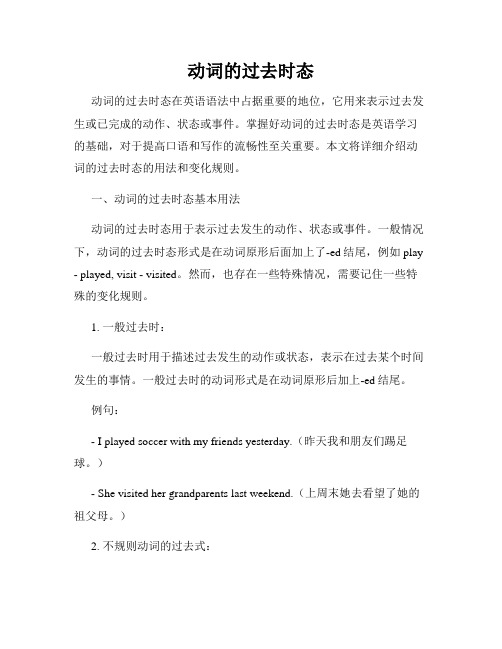
动词的过去时态动词的过去时态在英语语法中占据重要的地位,它用来表示过去发生或已完成的动作、状态或事件。
掌握好动词的过去时态是英语学习的基础,对于提高口语和写作的流畅性至关重要。
本文将详细介绍动词的过去时态的用法和变化规则。
一、动词的过去时态基本用法动词的过去时态用于表示过去发生的动作、状态或事件。
一般情况下,动词的过去时态形式是在动词原形后面加上了-ed结尾,例如play - played, visit - visited。
然而,也存在一些特殊情况,需要记住一些特殊的变化规则。
1. 一般过去时:一般过去时用于描述过去发生的动作或状态,表示在过去某个时间发生的事情。
一般过去时的动词形式是在动词原形后加上-ed结尾。
例句:- I played soccer with my friends yesterday.(昨天我和朋友们踢足球。
)- She visited her grandparents last weekend.(上周末她去看望了她的祖父母。
)2. 不规则动词的过去式:一些常用的不规则动词过去时态的变化规则需要特别记住,因为它们的过去时态形式与原形完全不同。
例句:- go - went- take - took- eat - ate3. 过去进行时:过去进行时用于描述过去某一特定时间正在进行的动作或情况。
过去进行时的构成是:was 或 were + 动词的现在分词。
例句:- He was studying when I called him.(当我给他打电话时,他正在学习。
)- They were playing basketball in the park yesterday.(昨天他们在公园里玩篮球。
)4. 过去完成时:过去完成时用于表达过去某个时间或动作之前已经发生或已经完成的动作或事件。
过去完成时的构成是:had + 动词的过去分词。
例句:- She had already finished her homework when I arrived.(当我到达时,她已经完成了作业。
动词的时态过去现在将来

动词的时态过去现在将来动词的时态——过去、现在、将来时态是语法中用来表示动作或状态发生的时间的一种方式。
动词的时态通常包括过去时(Simple Past)、现在时(Simple Present)和将来时(Simple Future)。
一、过去时(Simple Past)过去时表示在过去某个特定时间发生的动作或状态。
在过去时,一般情况下,动词是原形后加上了-ed或-d构成的,但也有一些特殊动词要进行变化。
1. 构成:动词的过去式通常通过在动词原形后加上-ed形式构成,如:- walk → walked(走→ 走过)- play → played(玩→ 玩过)- study → studied(学习→ 学习过)2. 特殊变化:有些动词过去式形式不遵循普遍规律,需要特别记忆,如:- go → went(去→ 去过)- have → had(有→ 有过)- be → was/were(是→ 是过)二、现在时(Simple Present)现在时表示目前正在进行或经常性发生的事情,也可以用来表示客观真理和习惯性的行为。
1. 构成:现在时动词一般不变化,直接使用原形,如:- I walk to school every day.(我每天走路去学校。
)- She plays basketball on weekends.(她周末打篮球。
)2. 第三人称单数变化:当主语是第三人称单数(he/she/it)时,动词要进行变化,通常在动词后加上-s形式构成,如:- He walks to the park.(他走路去公园。
)- She plays the piano.(她弹钢琴。
)三、将来时(Simple Future)将来时表示将来某个时间还未发生的动作或状态。
在将来时,一般会使用助动词will或be going to来构成。
1. 构成:- will + 动词原形:用于表示未来计划、意愿、预测等,如:- I will call you later.(我等一下给你打电话。
动词时态-常用9种

常用9种动词时态一般现在时,一般过去时,一般将来时,现在进行时,过去进行时,将来进行时;现在完成时,过去完成时,过去将来时;一、一般现在时1.概念:经常、反复发生的动作或行为及现在的某种状况。
2.时间状语:Always, usually, often, sometimes, every week (day, year, month…), once a week(day, year, month…), on Sundays,3.基本结构:动词原形(如主语为第三人称单数,动词上要改为第三人称单数形式)4.否定形式:主语+am/is/are +not+其他; 此时态的谓语动词若为行为动词,则在其前加don't, 如主语为第三人称单数,则用doesn't,同时还原行为动词。
5.一般疑问句:把be动词放于句首;用助动词do提问,如主语为第三人称单数,则用does,同时,还原行为动词。
6.例句:It seldom snows here.这里很少下雪。
He is always ready to help others.他总是乐于帮助别人。
Action speaks louder than words.事实胜于雄辩。
二、一般过去时1.概念:过去某个时间里发生的动作或状态;过去习惯性、经常性的动作、行为。
2.时间状语:ago, yesterday, the day before yesterday, last week, last(year, night, month…), in 1989, just now, at the age of 5, one day, long long ago, onceupon a time, etc.3.基本结构:主语+动词或be的过去时+名词4.否定形式:主语+was/were +not+其他;在行为动词前加didn't,同时还原行为动词。
5.一般疑问句:was或were放于句首;用助动词do的过去式did 提问,同时还原行为动词。
“过去时”和“过去式”的区别

“过去时”和“过去式”的区别“过去时”和“过去式”的区别过去式指动词的一种形式,如buy的过去式是bought过去时是时态的一种,表示这件事情发生在过去。
在过去时中动词要用过去式形式,如He bought a pen yesterday.他昨天买了一只钢笔。
英语过去式和过去时的区别过去式是形式,是指动词的过去式过去时是时态.....动词的过去的时态...其实没多大区别....经常说混了...不过需要注意的是过去分词这种形式不能和过去式弄混了法语早的简单过去时、未完成过去时、过去式、最近过去时之间有什么区别啊?简单过去时多用于书面表达(小说之类文学作品里),日常表达(尤其口语)基本不用这个世态为完成过去时和过去时最常用,前者用于背景描写/铺垫,后者描述动作和主要意思.复合过去时可以单独使用,但未完成过去时则多配合复合过去时使用,单独使用的情况非常少,而且多有上下文.这两者的区别讨论有非常多的资料,在baidu里随便找找也有不少很详尽的解释,此不冗述最近过去时多用于口语,表示"刚刚".过去式与一般过去时有什么区别一般过去式,我们平时就简称过去式,哈哈,是一样的,没有区别。
到底是过去式还是过去时?过去时是一种时态,过去式是过去时的动词的一个形式= =过去时 Sometimes I play 的play要用过去式吗不用吧!复合过去时和愈过去时的区别嗯,区别很明显,我就是法语专业的。
复合过去时,就是英语中的一般过去时,表示过去具体某个时间发生的事,强调动作。
愈过去时,是英语中的过去完成时,表示过去的过去,一般有个过去的时间为参照,在某个过去的时间之前发生的动作。
一般过去时和一般过去式一样吗前者指句子的(一般过去)时态,后者指动词的(过去)形式。
法语:复合过去时和直陈式未完成过去式的详细区别?首先,这两种都是表示过去发生的事情具体用法,马晓红教材或语法书上面都写了很多估计是无法理解,才会提出这个问题我用我们汉语的例子向你说明一下,可能更直观复合过去时更倾向于表示动作的完成而未完成过去式表示过去的状态的描述我们在表述现在时的时候,其实是分动作和状态的状态:他吃着呢。
过去式的标志词和用法

过去式的标志词和用法过去式的标志词包括:yesterday、last week、last month、last year、two years ago、in the past 等。
过去式的用法主要是在描述过去的动作、状态或事件时使用。
例如,“I went to the park yesterday.”(我昨天去了公园),“She studied English last week.”(她上周学习了英语),“They lived in Paris for two years ago.”(他们两年前住在巴黎)等。
此外,过去式也可以用来描述过去的习惯或行为,例如,“I used to play soccer every day.”(我过去每天都踢足球)。
过去式的标志词和用法包括以下几个方面:1. 动词变化:大多数动词在表示过去时态时需要进行变化,如“do”变为“did”、“eat”变为“ate”等。
2. 副词变化:有些副词在表示过去时态时需要进行变化,如“now”变为“then”、“usually”变为“unusually”等。
3. 助动词:助动词如“be”、“have”、“do”等在表示过去时态时也需要进行变化,如“is”变为“was”、“have”变为“had”等。
4. 时间状语:一些时间状语如“yesterday”、“last night”、“last year”等可以用来表示过去时态。
5. 表示过去的动词短语:一些动词短语如“used to”、“came back”、“left early”等也可以用来表示过去时态。
6. 过去完成时态:过去完成时态用来表示过去某个时间之前已经完成的动作,需要使用“had”作为助动词。
总之,过去式的标志词和用法可以根据动词的变化、副词的变化、助动词的变化、时间状语、表示过去的动词短语以及过去完成时态等进行表达。
一般过去时的变化规则

一般过去时的变化规则过去时是英语中最基础的时态之一,在英语学习中非常重要。
过去时用于表示已经发生的动作或状态,一般情况下是在动词的后面加上“-ed”结尾。
下面我来更详细地介绍一下一般过去时的变化规则。
1. 一般规则对于动词的一般过去时,在动词的词干(即除去-ing,-ed,-s三个词尾,只留下动词原形)后加上了“-ed”这个词尾。
例如:- walk -> walked (走路 -> 走过了)- jump -> jumped (跳 -> 跳过了)- rain -> rained (下雨 -> 下了雨)注:对于以“e”结尾的动词,只需要在其后面加上“d”这个词尾即可。
- love -> loved (喜爱 -> 喜爱了)- hike -> hiked (远足 -> 远足了)对于以一个辅音字母结尾的重读闭音节的动词,需要双写辅音字母,然后再加上“-ed”这个词尾。
例如:- stop -> stopped (停止 -> 停止了)- drop -> dropped (投掷 -> 投掷了)注:有些重读音节的动词,不用双写辅音字母,因为它们以“w”、“x”、“y”结尾。
例如:- blow -> blew (吹 -> 吹了)- tax -> taxed (对...课税 -> 对...课税了)2. 不规则动词不是每个动词都遵循一般规则的变化方式。
有一些动词是不规则动词,它们在一般过去时的变化方式与规则动词不同。
例如:- go -> went (去 -> 去了)- eat -> ate (吃 -> 吃了)- sleep -> slept (睡 -> 睡了)对于不规则动词,我们需要大量的练习以便熟练记忆它们的变化方式。
3. 特殊情况在英语语言中,有一些动词在变化时需要注意一些特殊情况。
动词时态和过去的表示如何用不同的动词时态表示过去
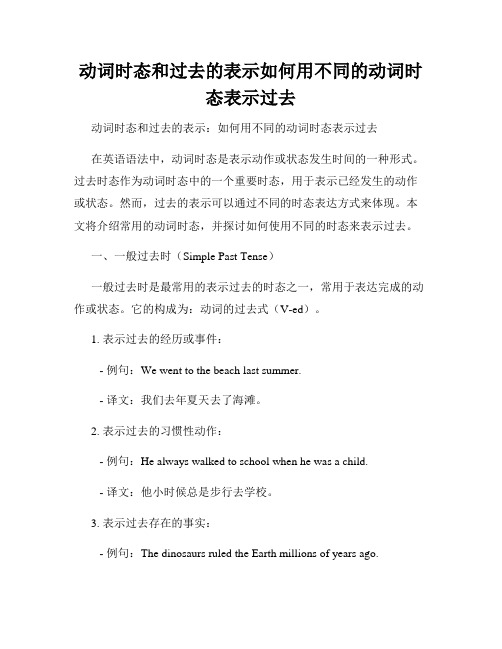
动词时态和过去的表示如何用不同的动词时态表示过去动词时态和过去的表示:如何用不同的动词时态表示过去在英语语法中,动词时态是表示动作或状态发生时间的一种形式。
过去时态作为动词时态中的一个重要时态,用于表示已经发生的动作或状态。
然而,过去的表示可以通过不同的时态表达方式来体现。
本文将介绍常用的动词时态,并探讨如何使用不同的时态来表示过去。
一、一般过去时(Simple Past Tense)一般过去时是最常用的表示过去的时态之一,常用于表达完成的动作或状态。
它的构成为:动词的过去式(V-ed)。
1. 表示过去的经历或事件:- 例句:We went to the beach last summer.- 译文:我们去年夏天去了海滩。
2. 表示过去的习惯性动作:- 例句:He always walked to school when he was a child.- 译文:他小时候总是步行去学校。
3. 表示过去存在的事实:- 例句:The dinosaurs ruled the Earth millions of years ago.- 译文:恐龙在几百万年前统治着地球。
二、过去进行时(Past Continuous Tense)过去进行时用于表示在过去某个时间点正在进行的动作或状态。
它的构成为:was/were + 动词-ing。
1. 表示过去的持续动作:- 例句:They were studying in the library when the earthquake happened.- 译文:地震发生时,他们正在图书馆里学习。
2. 表示过去同时进行的动作:- 例句:I was cooking dinner while she was watching TV.- 译文:我在做晚餐的同时,她在看电视。
三、过去完成时(Past Perfect Tense)过去完成时用于表示在过去某个时间点之前已经完成的动作或状态。
- 1、下载文档前请自行甄别文档内容的完整性,平台不提供额外的编辑、内容补充、找答案等附加服务。
- 2、"仅部分预览"的文档,不可在线预览部分如存在完整性等问题,可反馈申请退款(可完整预览的文档不适用该条件!)。
- 3、如文档侵犯您的权益,请联系客服反馈,我们会尽快为您处理(人工客服工作时间:9:00-18:30)。
一般过去时一.表示过去某个时间发生的事情或存在的状态。
常与一般过去时态连用的时间有:yesterday, yesterday morning (afternoon, evening…)last night (week, month, year…),a moment ago, a week ago, three years ago…just now,二.构成及变化1. be动词在一般过去时中的变化:am 和is在一般过去时中变为was(was not=wasn’t)are在一般过去时中变为were(were not=weren’t)带有was或were的句子,其否定、疑问的变化和is, am, are一样,即否定句在was或were后加not,一般疑问句把was或were调到句首。
2.行为动词在一般过去时中的变化肯定句:主语+ 动词的过去式.I watched a film last Sunday .否定句:主语+ didn’t + 动词原形.I di dn’t watch a film last Sunday .一般疑问句:Did + 主语+ 动词原形?Did you watch a film last Sunday?Yes, I did. / No, I didn’t .特殊疑问句:疑问词+ 以did 开头的一般疑问句?What did you do last Sunday?专项练习一、请用正确动词形式填空。
1. I ________ (have) an exciting party last weekend.2. ____ she ____(do) her homework yesterday? No, she ________.3. What _______ Tom _______ (do) last Saturday evening?He ______(watch) TV and _______(read) an interesting book.4. She_______(not visit) her aunt last weekend. She ______ (stay) at homeand ________(do) some cleaning.5. When ____ you ______(write) this song? I _____(write) it last year.6. My friend, Carol, ________(study) for the math test and ________(practice)English last night.7. How ______(be) Jim's last two weekends? It _______(be not) bad.8. Tom and Mary __________ (come) to China last month.9. I _________ (call) Mike this morning.10. I listened but _______ (hear) nothing.11. Tom _________ (begin) to learn Chinese last year.12. Last week we _______ (pick) many apples on the farm.13.______ your father _____ ( go ) to work every day last year?14. What time ______ you ______ (get) to Beijing yesterday?We _________ (get) to Beijing at 9:00 in the evening.15. What _________ (make) him cry just now?16. Last year the teacher ____ (tell) us that the earth________(move) around thesun.17. There _________ not enough people to pick apples that day. (be)18. There ________ enough milk at home last week, wasn't there? (be)19. Jack _________ (clean) the room just now.20. It _______ (be) hot yesterday and most children _____ (be) outside.二. 请用正确动词形式填空。
1. --______ she ______(practice) her guitar yesterday?--No, she _______.2. They all ____(go) to the mountains yesterday morning.3. --When _______ you ________(write) this song?--I ________(write) it last year.4. --_______ Mr. Li _______(do) the project on Monday morning?--Yes, he ______.5. --______ (be) your mother a sales assistant last year?--No, she ________.三. 选择填空。
( ) 1.They a meeting yesterday afternoon.A. hasB. haveC. havingD. had( ) 2.What is the last month of a year? _________.A. NovemberB. AugustC. DecemberD. October( ) 3.We any classes last week.A. didn’t haveB. don’t haveC. don’t hadD. didn’t had( ) 4.He lunch an hour ago. Now, he’s out.A. hasB. eatsC. haveD. had( ) 5. -- Were you at home yesterday?-- No, I ______. I was ______ work.A. wasn't, atB. weren't, inC. wasn't, inD. weren't, at( ) 6. -- _____ was Mrs. Brown yesterday?-- She was ill.A. WhereB. WhichC. HowD. How often( ) 7. -- What day was it yesterday?-- _______.A. It's MondayB. It was Mid-AutumnC. It's September 10( ) 8. -- What ____ wrong with you last week?-- I was a little ill.A. wereB. isC. areD. was( ) 9. The twins ____ in China last year. They ______ here again next year.A. are, comeB. were, are comingC. was, are goingD. is, are going to come( ) 10. We ____ a class meeting three days ago.A. didn't haveB. don't hadC. didn't hadD. don't have( ) 11. -- What _____?-- It was Friday.A. was the dateB. day is todayC. day was it yesterdayD. is day today( ) 12. -- Did you have a good time yesterday?-- Yes, ______.A. I wasB. I didC. I haveD. I had( ) 13. -- What did they have for supper yesterday evening?-- ______.A. Yes, I didB. No, porridgeC. Rice and meatD. Yes, eggs( ) 14. ______did you have lunch? Which is not right?A. WhenB. WhatC. WhereD. Why( ) 15. -- When _____ he come here?-- An hour ago.A. wasB. didC. isD. does四. 用所给动词的正确时态填空。
1. Jim usually______(do) his homework at home.But yesterday he______(do) it at school.2. My father______(go) to Shanghai last week.He______(come) back yesterday evening.3. Mike______(go) to school on foot every day.But yesterday he ______ (go) to school by bike.4. I______(get) up late yesterday.5. We______(have) a good time in the park yesterday.五. 改错题1. How is Jane yesterday? ______________________________2. He go to school by bus last week. ______________________________3. He often goes home at 6:00 last month. ______________________________4. Who find it just now ? ______________________________5. Did you saw him just now. _______________________________6. Tom wasn’t watch TV last night. _______________________________7. I didn’t my do homework yesterday. _______________________________8. He wait for you three hours ago. _______________________________六、句型转换1. The children had a good time in the park. (改为反意疑问句)The children had a good time in the park, _____________ ?2. There were about nine hundred people at the concert. ( 音乐会)否定句:_________________ about nine hundred people at the concert.一般疑问句:______________________________________________ 对划线部分提问:__________________________________________ 3. There was only one problem.否定句:__________________________________________________ 一般疑问句:______________________________________________ 4. Ann did her homework yesterday evening.否定句:Ann ___________her homework yesterday evening一般疑问句:_________________________________________________ 对划线部分提问:_____________________________________________ 5. Last week I read an English book. (改为否定句)Last week I _______________________ an English book.6. My brother was in the park just now.否定句:_____________________________________________________ 一般疑问句:_________________________________________________ 对划线部分提问:_____________________________________________。
